|

| |
D. B. SANDERS
was born in Guilford county, North Carroliua, in
1819. At the age of ten years he walked from his birth
place to Richmond, Indiana, where his mother resided.
Here he was "bound out" to a Mr. Holman, who
treated him badly, and he ran away. In March, 1830,
barefooted, he walked from Richmond to Oxford, where
Joseph Stafford, his cousin resided. Here
he learned the smith trade with Frank Davis.
In 1844, he came to Hamilton and entered the employ of
Philip Berry, at the corner of Basin and Reily
streets. In 1848, at the head of the basin, he opened
a restaurant on a small scale and begun the manufacture of
cigars. At that time the basin extended to Smith
street, in the rear of Dr. Markt's drug store.
In this locality fighting was a favorite pastime and it was
no uncommon thing for three or four encounters to take place
during a single day.
Subsequently he removed to No. 17 Third street, in the
property now occupied by C. A. Stroble and continued
in business at this location for upwards of thirty years.
There was a time when every man, woman and child in Hamilton
knew the genial "Brook Sanders." He had
a kind word and pleasant smile for every one. He began
on a capital of $25.00, but by close application to business
and gentlemanly treatment amassed a competence in a few
years. He was Mayor of Hamilton from 1883 to 1887, and
his administration was a creditable one. He resides in
a fine residence on Dayton street. In the twilight of
life he is the same " Brook Sanders" as of
old. He is prominent in the order of Odd Fellows and
the Canton of Patriarchs Militant of this city was named
after him.
Source: Biographical & Historical Sketches - A
Narrative of Hamilton and Its Residents from 1792 to 1896 -
Publ. 1896 - Page 140 |
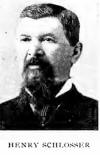
Henry Schlosser |
HENRY SCHLOSSER
Source: Biographical & Historical Sketches - A
Narrative of Hamilton and Its Residents from 1792 to
1896 - Publ. 1896 - Page 435 |
|
|
JACOB SCHLOSSER
Source: Biographical & Historical Sketches - A
Narrative of Hamilton and Its Residents from 1792 to
1896 - Publ. 1896 - Page 454 |
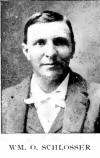
Wm. O. Schlosser
|
WILLIAM O. SCHLOSSER
Source: Biographical &
Historical Sketches - A Narrative of Hamilton and Its
Residents from 1792 to 1896 - Publ. 1896 - Page 436 |
|
PHOTO |
PETER SCHWAB
Source: Biographical & Historical Sketches - A
Narrative of Hamilton and Its Residents from 1792 to
1896 - Publ. 1896 - Page 453 |
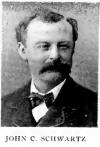
John C. Schwartz |
JOHN C. SCHWARTZ
was born in Nurenberg, Germany, in 1852. His
parents emigrated to America, when he was six months
old, locating in Cincinnati. Afterward, in 1853,
they came to Hamilton, where the subject was educated in
our public schools. Later he entered as a drug
clerk with Bruck & Bender, who operated the drug
store now occupied by Dr. A. Myers and company.
After clerking in a Cincinnati wholesale and retail drug
store Mr. Schwartz attended the Philadelphia
School of Pharmacy. After graduation he entered
the store of Dr. John R. Brown of the first ward
and later went with Dr. C. Markt, where he
remained for six years. He then engaged in
business for himself in the old Jacobs' drug
store. Mr. Schwartz's eighteen years of
successful business life in Hamilton has shown him to be
a man of business ability; a man honorable and reliable
in all his dealings with the people. Socially, he
is a member of the Knights of Pythias and the Royal
Arcanum. Mr. Schwartz enjoys a reputation
of the highest character, professionally and otherwise.
Source: Biographical & Historical Sketches - A
Narrative of Hamilton and Its Residents from 1792 to
1896 - Publ. 1896 - Page 383 |
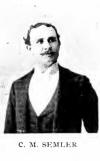
C. M. Semler |
CONRAD M.
SEMLER was born in Hamilton, Aug.
20, 1863. He was educated in the public schools of
this city, which was afterward supplemented by a
business course in a Commercial College. Later he
learned the miller's trade with his father, John
Semler, who came west from Pennsylvania in 1849,
locating at Amanda, this county. In 1862, he came
to Hamilton and engaged in the milling business for
himself. In 1886, he erected the Eagle Mills, when
our subject became his father's partner, and has ever
since been a member of the firm of Semler & Co.
At the death of John Semler, Apr. 28, 1892, at
the age fifty-six, the business passed into the full
management of the oldest son, Conrad. Later
in the same year Anderson & Shaffer's plant was
purchased and the out-put of the mill increased from
seventy-five to five hundred barrels per day. The
local trade is managed by George Semler, and the
offices are under control of Philip Semler.
In addition to an extensive local trade, the firm
annually sends thousands of barrels of flour to the
Eastern and Southern markets. The Semler
Brothers have a thorough knowledge of the milling
business; are courteous gentlemen and their solidity and
integrity is unquestioned. Conrad Semler is
the owner of valuable residence property and a number of
lots in Semler's Addition to South Hamilton.
Socially, he is a member of Hamilton Council No. 338,
Royal Arcanum. In politics he is a Democrat.
He is a member of the First Presbyterian church.
He is a faithful and unswerving friend to the best
interests of Hamilton and contributes liberally to every
movement for her advancement, which entitled him to a
representation in a history of his native city.
Source: Biographical &
Historical Sketches - A Narrative of Hamilton and Its
Residents from 1792 to 1896 - Publ. 1896 - Page 431 |
|
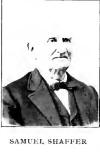
Samuel Shaffer |
SAMUEL SHAFFER
Source: Biographical & Historical Sketches - A
Narrative of Hamilton and Its Residents from 1792 to
1896 - Publ. 1896 - Page 408 |
| |
JOHN A. SHANK,
was born in Cincinnati in 1834. He attended the
schools of his native city and was graduated from Woodward
High school in 1853. He taught School in Cincinnati
previous to his call to the Superintendency of the Hamilton
schools in 1863. He was well equipped for this
responsible position being a good disciplinarian and a fine
scholar. His ideas were advanced in school work, and
he repeatedly urged radical changes in the line he
suggested, but the Board of Education was not inclined to
take immediate action. At the close of the school year
he resigned the Superintendency of our schools and accepted
a similar position in Northwestern Ohio. Subsequently
he studied law and practiced his profession in Cincinnati.
In 1873 he was elected on the Democratic ticket,
representative to the General Assembly, from Hamilton
county. He is now located in the state of Washington.
Source: Biographical & Historical Sketches - A
Narrative of Hamilton and Its Residents from 1792 to 1896 -
Publ. 1896 - Page 109 |
| |
MANDES SHULER
Source: Biographical & Historical Sketches - A
Narrative of Hamilton and Its Residents from 1792 to
1896 - Publ. 1896 - Page 376 |
| |
RANSFORD
SMITH was born in Oxford township in 1834. He was
graduated from old Miami in the class of 1855. While
attending college he studied law with his father, W. H.
Smith.
In 1855-56 he taught school in the "old church
building" in the First ward. In 1857 he was admitted to the
bar and opened an office on the East side. On April 4,
1859, he was elected Mayor, defeating Edward
Dalton, the Democratic nominee. Sectarianism entered
into this contest to a considerable degree, as the Catholic
clergy were opposed to the text books used and the reading
of King James' version of the Bible in the schools. In
August, 1861, he enlisted in Company "B," Thirty-fifth
regiment, O. V. I., and was commissioned first lieutenant.
He was afterward promoted to the captaincy, and resigned in
1864. Upon his return from the army he resumed the practice
of law in Hamilton and Cincinnati. In the latter city he
formed a partnership with Governor Thomas
Young and Samuel Crawford and took up his residence at
Riverside, where he remained until 1878. In 1879 he removed
to Ogden, Utah, where he was successful as a lawyer.
He was a territorial delegate to the Chicago National
convention of 1884 that nominated Cleveland for president.
He died in 1895.
Source: Biographical & Historical Sketches - A
Narrative of Hamilton and Its Residents from 1792 to 1896 -
Publ. 1896 - Page 134 |
|
PHOTO |
CHARLES SOHNGEN
Source: Biographical &
Historical Sketches - A Narrative of Hamilton and Its
Residents from 1792 to 1896 - Publ. 1896 - Page 437 |
|
PHOTO |
GEORGE P. SOHNGEN
Source: Biographical & Historical Sketches - A
Narrative of Hamilton and Its Residents from 1792 to
1896 - Publ. 1896 - Page 437 |
| |
LOUIS SOHNGEN
Source: Biographical & Historical Sketches - A
Narrative of Hamilton and Its Residents from 1792 to
1896 - Publ. 1896 - Page 441 |
| |
A.
C. STEPHENSON. The subject of this sketch was
born in Reading, Hamilton county, December 10, 1826; was
educated in the common schools; followed farming and school
teaching from 1849 until the fall of 1854, when he came to
Hamilton. His first employment here was in the
capacity of book keeper for the Hamilton Distilling Company,
operated by Robert McAdams and James
Beatty. In 1858, he engaged in the brewing
business on Canal street. In 1864, he was a partner in the
Hamilton Distilling Company composed of D. W. Brant,
Major A. A. Phillips and Peter Schwab.
He was book keeper for Murphy, Stillwaugh &
Ruoff. He was deputy sheriff under Colonel A.
A. Phillips until Alf Reese's election. He
was elected justice of the peace of Fairfield township and
the East Side in 1863 and served until June, 1866, when he
was appointed by council, Mayor pro tern, to fill out the
unexpired term of Daniel Longfellow, who died
May twenty-fifth of the same year. In April, 1867, he was
elected Mayor, and was re-elected in 1869.
On December 13, 1877, he was chosen justice of the
peace and served continuously until December 27, 1893.
During his entire official term he had the respect and
confidence of the bar. His decisions were fair and
impartial, as he had, in all these years, but few cases
reversed in the higher court. He is justice of the peace at
present.
Source: Biographical & Historical Sketches - A
Narrative of Hamilton and Its Residents from 1792 to 1896 -
Publ. 1896 - Page 135 |
| |
JACOB STILLWAUGH
Source: Biographical & Historical Sketches - A
Narrative of Hamilton and Its Residents from 1792 to
1896 - Publ. 1896 - Page 449 |
| |
MEYER STRAUSS
Source: Biographical & Historical Sketches - A
Narrative of Hamilton and Its Residents from 1792 to
1896 - Publ. 1896 - Page 442 |
| |
NOAH STUBBS
Source: Biographical & Historical Sketches - A
Narrative of Hamilton and Its Residents from 1792 to
1896 - Publ. 1896 - Page 363 |
| |
SAMUEL
G. SWEENEY clerked in the iron store of John
Winton, situated on the north side of Main street,
between A and B streets. Subsequently he purchased the
store and was appointed Postmaster, serving from March 2,
1837, until March 29, 1839. He was a member of the
"Butler Guards," a crack military company commanded by the
late Col. L. D. Campbell. Mr. Sweeney remained
a bachelor during his life time. His business was
conducted upon thorough and accurate methods, and the
knowledge of the business possessed by him in dealing, and
his fairness in all transactions commended him in an eminent
degree to the favor and confidence of the trade. No
one knows where he removed to, or the date of his death.
Source: Biographical & Historical Sketches - A
Narrative of Hamilton and Its Residents from 1792 to 1896 -
Publ. 1896 - Page 130 |
NOTES:
|
![]()
![]()
![]()
![]()